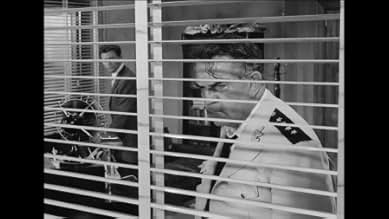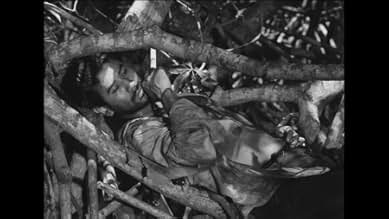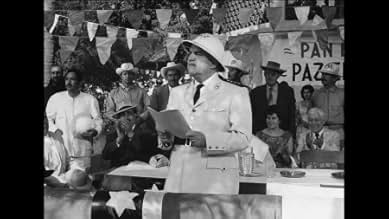La fièvre monte à El Pao
- 1959
- 1h 37min
VALUTAZIONE IMDb
6,8/10
1435
LA TUA VALUTAZIONE
Aggiungi una trama nella tua linguaAfter a Caribbean despot's murder, two men compete for his widow Ines on Ojeda, a prison island. When a hardliner takes power and targets his rival, bureaucrat Vazquez seeks support from loc... Leggi tuttoAfter a Caribbean despot's murder, two men compete for his widow Ines on Ojeda, a prison island. When a hardliner takes power and targets his rival, bureaucrat Vazquez seeks support from locals and inmates to remove him.After a Caribbean despot's murder, two men compete for his widow Ines on Ojeda, a prison island. When a hardliner takes power and targets his rival, bureaucrat Vazquez seeks support from locals and inmates to remove him.
- Regia
- Sceneggiatura
- Star
María Félix
- Inés Rojas
- (as Maria Felix)
Miguel Ángel Ferriz
- Le gouverneur Mariano Vargas
- (as M.A. Ferriz)
Raúl Dantés
- Le lieutenant García
- (as Raoul Dantes)
Luis Aceves Castañeda
- López - le secrétaire de Gual
- (non citato nei titoli originali)
Armando Acosta
- Manuel
- (non citato nei titoli originali)
Miguel Arenas
- Le vice-président Barreiro frère du président
- (non citato nei titoli originali)
Edmundo Barbero
- Le procureur
- (non citato nei titoli originali)
Augusto Benedico
- Le ministre Sáenz
- (non citato nei titoli originali)
Antonio Bravo
- Le juge
- (non citato nei titoli originali)
José Chávez
- Le chauffeur transportant Inès Rojàs
- (non citato nei titoli originali)
Recensioni in evidenza
Known as «Los ambiciosos» in México, the co-producing country where director Luis Buñueñ relocated to, lived and died, as well as in most Latin American territories, this was made in 1959, the year Fidel Castro took power in Cuba, so while anyone can believe the plot and location refers to him and his homeland, they do not. Yes, the island of Ojeda is a Caribbean country ruled by a dictator (Andrés Soler at his meanest - he does receive credit in the Mexican version), but its banana-based economy (no sugar, tobacco or rum, as in Cuba) and the absence of a guerrilla movement, makes it "NowhereLand" with Gérard Philipe (in his last role) as a handsome idealist who falls for the wrong woman (María Félix looking very beautiful). In any case we will never know if Buñuel or in that case novelist Henri Castillou were able to see the future. A good political melodrama.
for me, its basic virtue is to be the last film of Gerard Philipe. and an experiment , with decent result, of Bunuel trip in politic noir genre. it is far to be a good or a bad movie. because the genre was defined by Costa Gavras , it was very popular in "60 decade and it seems have the status of fragile equilibrium between themes, motifs, explanations, pretexts. the meet between Maria Felix and Jean Servais does the presence of Gerard Philipe almost symbolic. sure, at the second view, his Vazques becomes more realistic but more as the honest young man against a corrupt regime, in clothes of David against Goliath. short, a good film for another side of Bunuel art. for a reasonable portrait of dictatorship. and for few references to Soviet Union. or Franz Kafka.
In the fictitious island of Ojeda, people lives a dictatorship and the island is a penal colony of forced labor with ordinary and political prisoners together. When the Governor Mariano Vargas (Miguel Ángel Ferriz) is murdered by a sniper, his idealistic secretary Ramón Vázquez (Gérard Philipe) is assigned director of security and in charge of the prison. Vázquez is in love with the widow Inés Rojas (Maria Felix) and they have a love affair. But when the new governor Alejandro Gual Miguel (Jean Servais) arrives in the island, he wants Inés to be his lover. Further he forces the killer to sign a false confession telling that Vázquez is the responsible for the attempt against the previous governor and blackmails Inés. But Inés is a female fatale that knows the political games and manipulations.
"La fièvre monte à El Pao" is a political melodrama by Buñuel based on politics instead of his famous surrealism. The theme politics was adopted by Costa-Gravas years later and Glauber Rocha probably wrote his "Terra em Transe" inspired in this movie. Inés Rojas is a femme fatale but the plot is not a film-noir, only the story of an idealistic man that joins politics in a dictatorship and finds how difficult is keep his ideals. My vote is seven.
Title (Brazil): "Os Ambiciosos" ("The Ambitious")
"La fièvre monte à El Pao" is a political melodrama by Buñuel based on politics instead of his famous surrealism. The theme politics was adopted by Costa-Gravas years later and Glauber Rocha probably wrote his "Terra em Transe" inspired in this movie. Inés Rojas is a femme fatale but the plot is not a film-noir, only the story of an idealistic man that joins politics in a dictatorship and finds how difficult is keep his ideals. My vote is seven.
Title (Brazil): "Os Ambiciosos" ("The Ambitious")
This is a comparatively obscure entry in the Luis Bunuel canon and although the whole is less than the sum of its parts, this never less than intriguing director has given us a combination of pot boiler and seering political statement.
The mercurial and charismatic Gérard Philippe plays a man whose idealistic principles cause incalculable damage and the poignancy of his well-meaning but tragic character is enhanced by a visibly ailing actor who was to die of liver cancer four months after filming was completed.
It must be said that the 'fever' of the title doesn't really amount to much as the anticipated mutiny by the prisoners takes place off screen but of course the temperature is guaranteed to rise and the pulse to quicken whenever the force of nature that is Maria Félix is on the premises. The film's most effective scene, for this viewer at any rate, is that in which her apparent submission to Jean Servais is in fact a triumph of dominance. Servais is a splendid villain and as always, his soulful expression evinces our sympathy no matter how nefarious the character he is playing.
Bunuel was not especially fond of this film and evidently regretted not having provided Philippe with a more worthy swansong. During the filming Bunuel happened to ask his leading man: "Why did you agree to make this film?" When Philippe said: "I don't know. And you?" the director replied: "I don't know either."
The mercurial and charismatic Gérard Philippe plays a man whose idealistic principles cause incalculable damage and the poignancy of his well-meaning but tragic character is enhanced by a visibly ailing actor who was to die of liver cancer four months after filming was completed.
It must be said that the 'fever' of the title doesn't really amount to much as the anticipated mutiny by the prisoners takes place off screen but of course the temperature is guaranteed to rise and the pulse to quicken whenever the force of nature that is Maria Félix is on the premises. The film's most effective scene, for this viewer at any rate, is that in which her apparent submission to Jean Servais is in fact a triumph of dominance. Servais is a splendid villain and as always, his soulful expression evinces our sympathy no matter how nefarious the character he is playing.
Bunuel was not especially fond of this film and evidently regretted not having provided Philippe with a more worthy swansong. During the filming Bunuel happened to ask his leading man: "Why did you agree to make this film?" When Philippe said: "I don't know. And you?" the director replied: "I don't know either."
One of Bunuel's most straightforward films and his most openly political, a drama about an idealist trying to foment rebellion in the fictional town of El Pao. Lacking Bunuel's comic sensibilities or surrealist touch, it's a pretty cut-and-dry affair with few surprises. The social commentary is sharp enough, but the film lacks zing and never seems to get off the ground. The highlight is the sultry performance by Maria Felix as the duplicitous wife of the governor. She gives Bunuel a chance to inject some of his sexual power dynamics and incorporate them into the political sphere. Otherwise, somewhat watchable but unengaging.
Lo sapevi?
- QuizIn his memoirs, Buñuel claims to have plagiarized the plot of this film from Puccini's opera "Tosca".
- Curiosità sui creditiHalf of the credits are displayed at the beginning of the film: the first seven member of the cast, director, writers, director of photography, composer, conductor, production companies, and executive producer. The closing credits display the other half (after the word "FIN"): Once again the cast list but this time the first eight actors, then the assistant director, script supervisor, unit manager, sound engineer, production manager, followed by the name of the dubbing facilities and laboratories.
- ConnessioniReferenced in Gérard Philipe: un homme pas un ange (2003)
I più visti
Accedi per valutare e creare un elenco di titoli salvati per ottenere consigli personalizzati
Dettagli
- Tempo di esecuzione1 ora 37 minuti
- Colore
- Mix di suoni
Contribuisci a questa pagina
Suggerisci una modifica o aggiungi i contenuti mancanti

Divario superiore
By what name was La fièvre monte à El Pao (1959) officially released in Canada in English?
Rispondi




























